Text
Some people don’t know about Aphrodite Areia and honestly I feel so bad for them
72 notes
·
View notes
Text
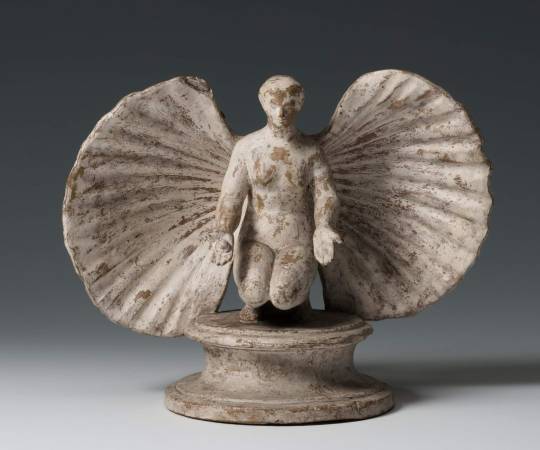
Aphrodite in a Shell
Southern Italy, 3rd-2nd century BCE
State Hermitage Museum, Saint Petersburg
#Aphrodite #GreekGoddess #GreekArt
298 notes
·
View notes
Text

Aphrodite, Greek goddess of love and beauty.
(Painting by Lindsay Rapp)
31 notes
·
View notes
Text







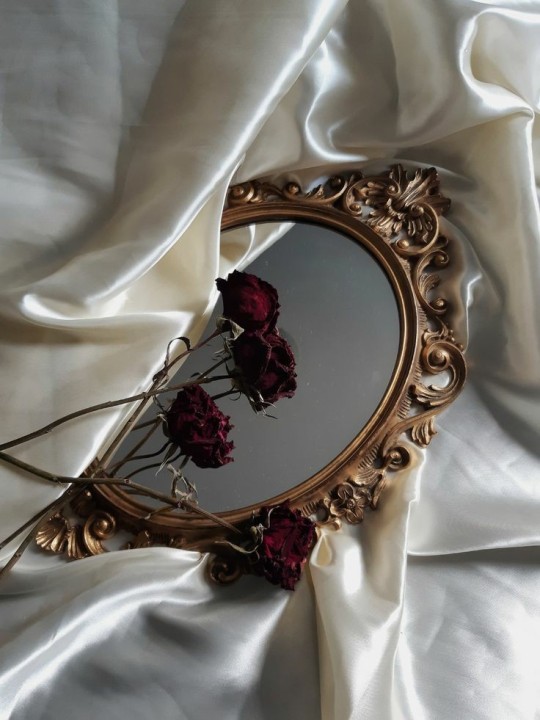
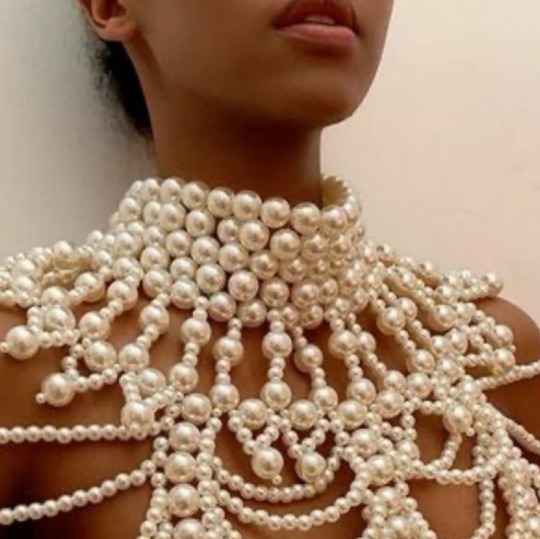
Deity Aesthetic: Aphrodite ➷ Pothon Mater (The Mother of Desire) 🥀
415 notes
·
View notes
Text
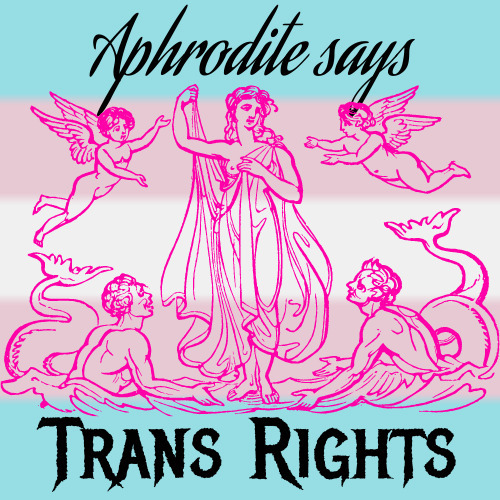
Credit to @jasper-pagan-witch for this fantastic graphic!! Go check out their blog for info on an Aphrodite worshippers discord server
[ID: an image of the transgender flag with an outline illustration in pink of Aphrodite surrounded by 2 cherubs and 2 merpeople. In black cursive font at the top it says “Aphrodite says” and at the bottom in bold black text it says “TRANS RIGHTS”. End ID]
957 notes
·
View notes
Text
10 Myths About Hellenismos
Today, let's address some popular myths (and the truths) about Hellenismos and its deities. Not very surprisingly, most of these things come from Wicca or Christian colonization. You can believe these things if you want, they just aren't from the religion.
Myth 1: Deity work is dangerous
Truth: Deity work, in Hellenismos, isn't any more dangerous than worshiping the Christian god is supposed to be. This notion didn't originate in Hellenismos, and is also a largely neopagan idea. Our theoi aren't monsters or aggressive. They won't kill you over tiny mistakes. Just respect them, do what you can, and you'll be fine.
Remember that even in the mythos, people aren't smited for the wrong offering. They're smited for blatant and deliberate disrespect, which by nature can't be done accidentally.
Our deities genuinely aren't easily angered. They wont be mad if you reach out to them, if you confuse them for something else, if you give them the wrong offering, etc.
Myth 2: You need to look out for entities impersonating deities
Truth: Again, this isn't remotely from Hellenismos. Our gods cannot be impersonated by evil entities. Frankly, we don't really have entities with that desire or power in the religion. If you're contacting a Hellenic deity, and you get an affirmative response, you contacted them. The idea you didn't, or that something else is lying to you, is from outside the religion. Our deities are more powerful than random ghosts, and our religion doesn't have that concept.
Myth 3: Hekate is a moon goddess/crone
Truth: Hekate is associated with the moon, but she is not a goddess of the moon. She is the goddess of one lunar phase--the dark moon, which is on the eve of Hekate's Deipnon. She is also not a crone goddess outside of neopaganism and Wicca. Historically, she was depicted as a maiden. Her triple form was also not maiden/mother/crone, simply a triple maiden-esque figure.
Myth 4: Hestia gave her seat to Dionysos/Apollon took Helios's chariot
Truth: Honestly, it's just a difference in counting. Some deities were and weren't Olympians depending on time, culture, and locations. No seats on Olympos were "given up," it's just that sometimes one is there and sometimes the other isn't.
As for the chariot, no. Apollon didn't replace Helios. They were synchronized, but Apollon didn't "take" the chariot, and Helios was never removed. Helios is still the sun--his name is literally "sun."
Myth 5: The myths are history/Hellenic Polytheists believe in the myths
Truth: The characters in myths are real to us, and some myths are literal, but in general, Hellenic mythology is not meant to be taken fully literally. Most of it is symbolic. Additionally, a lot of the r*pe in the mythos is translation errors. We believe in our heroes and our gods, and we believe there is truth in the myths, but no, our mythology isn't like Christian mythology--it's not expected or really encouraged to believe the myths are strictly true history. The myths aren't even consistent over time and location, so it's simply impossible to believe in all of them at once. But no, our gods do not act the way they do in mythology. Myths are by and for mortals, and do not capture the divine.
Myth 6: It's disrespectful to dress up as or write fiction about the gods
Truth: This is just ridiculous and ahistoric. The majority of Ancient Greek theater was deity cosplay and fanfiction. I said what I said.
This can definitely be done disrespectfully, but isn't inherently disrespectful. You also aren't required to represent the theoi fully accurately in this.
Myth 6: X god is Y orientation/gender
Truth: While you can certainly theorize our theoi's sexuality, and none of our gods are cishet by modern standards, none of the gods can only be interpreted as one gender or orientation. The terms we ascribe to them are based on mythos, portrayals, and modern interpretation of historic social roles.
The most common of these theories are maiden goddesses as aroace (ie. Hestia, Athena, Artemis), erastes (top) gods as bi men (ie. Zeus, Apollon, Patroklos), eromenos (bottom) gods as gay men (ie. Ganymedes, Hyakinthos, Akhilleus), and Artemis as a lesbian.
None of these are wrong, to be clear. It's just not as simple as using our modern labels for them. Erastes and eromenos were both considered straight in Ancient Greece; being a 'virgin' didn't always mean celibate; Artemis can be interpreted as bi, lesbian, and/or aroace based on her myths. You can interpret them however you like--I certainly interpret my gods as queer--but there is no single right answer.
Myth 7: You need a patron or to be devoted to someone, or can only have one patron/be devoted to one god, & devotion is an oath
Truth: Patron deities are more of a principle in neopaganism and Wicca than in Hellenismos. Worshiping the theoi does not require you to find a patron or devote to a deity, ever. Patronage is not particularly important or common, unless you are thinking of a patron god of a trade (ie. if you're a blacksmith your patron is Hephaistos).
Devotion is also not exclusive, and never requires an oath. Oaths in Hellenismos are extremely serious, and should never be taken without extreme caution. If you aren't willing to die if you break the oath, don't make it--find something else. You probably wont die, but that's the necessary level of certainty. Devotion, while serious, is not as serious as being oath-bound. You can be devoted to multiple deities, and devotion can be called off if needed. You can't really call off an oath.
Myth 8: X god is a r*pist!
Truth: Please stop it. Just stop it. No. Especially if you're basing that on Lore Olympus. The mythology isn't fact, weird inaccurate mythology fanfic written by someone who doesn't know anything about the myths isn't fact.
The mythology isn't straight up history. The myths were often mistranslated (the Greek word for r*pe didn't just mean r*pe) and they aren't facts. They were also products of their culture. So. No. They are not. And their worshipers aren't r*pe apologists.
Myth 9: Titans are evil and/or Olympians hate titans
Truth: Titans are fine. Really. They're not evil, they're not going to hurt you. They're just another kind of Theoi. Many of them were actually a large part of the historic religion. Hekate's Deipnon was a monthly festival, after all. And no, Olympians don't hate titans. Remember the point about myths not being literal.
Myth 10: The gods are jealous
Truth: No, the gods will not be jealous if you worship another god. They wont be jealous if you worship another pantheon, or if you need a break. If you're a god consort, they won't be jealous if you're interested in other mortals or deities. If you're a devotee, they won't be upset if you devote to other deities.
The most jealous a god gets is upset if you break an oath, promise, or agreement with them. If you promised them a daily libation but skipped it for another deity without permission, they may get upset. But even then, that's not really jealousy.
Myth 11: If you work with X deity, you can't work with Y
Truth: This is usually based on rivalry in mythology, and isn't true at all. Related to the above jealousy point, no deity in real life hates another deity, especially not enough that if you worship both they'll be upset. You can worship Aphrodite and Persephone. You can honor Hera and Leto.
Most of these gods are actually happy if you honor other theoi. Many of them are family, or share domains.
If enough people are interested, I might make a part two, because this is barely the tip of the iceberg. RBs welcome from pagans and non-pagans alike.
2K notes
·
View notes
Text
This Valentine’s Day I honor Aphrodite, Mother of love in all forms. Valentine’s Day is not just about romantic love, but the celebration of all kinds of love, and in turn, a celebration of the goddess.
I thank her for the love I give, the love I receive, the love I have experienced, and the love I will experience. I thank her for guiding me to learn to love myself and to love others openly. I thank her for giving me the ability to keep loving when love has broken me.
I believe love is the driving force of the universe. Love is triumphant over hate. Love heals.
Take the time to thank her, if nothing else, this Valentine’s Day 💕
109 notes
·
View notes
Text
Aphrodite and Confidence
Aphrodite has taught me so much over the years. Part of the reason why she’s my patroness is because I strive to be what she represents—beautiful, confident, strong, kind, patient, and loving. And if there’s one thing I’ve learned from Aphrodite, it’s that all of us already possess those things, but not all of us can see it.
One issue that I struggled with, and am still struggling with, is my self-confidence. From a young age, my self-esteem was low. I haven’t had any confidence in myself for over half my life. It’s hard to look at myself and like what I see, both inside and out.
I stumbled across an article on Huffpost one day, Aphrodite: Celebrating The Goddess Of Love And Beauty Within by Agapi Stassinopoulos, where the author explains their interactions with Aphrodite. One part of the article, years later, has stuck with me ever since:
Once, in one of our chats, I asked her what makes her so irresistible, seductive and adorable? She replied that, "All women are born beautiful. Knowing that, however, is their choice."
I firmly believe what Aphrodite said. All women are beautiful. And if that were true, how could I be the one and only exception? I doubt Aphrodite would think so. That quote really changed my perspective on myself. Or at least, it was the catalyst to my journey to finally loving and accepting myself, to change my distorted perception of how I should look and what makes me beautiful.
Whenever I feel ugly and undesirable and worthless, I imagine Aphrodite beside me smiling and shaking her head, because I know she would tell me the opposite. It helped me realize that my truth is not the truth.
Over much time, this hijacked my brain into deterring from negative self-talk as much. If you tell yourself something, your brain will believe it. I am by no means absolved from my low-self esteem, but I’ve noticed an improvement. Even if it’s slight, it’s something.
I feel most confident when putting on makeup, and when I feel really good about it, I praise Aphrodite, because when I do certain makeup looks, I truly feel beautiful, and I know that makes Aphrodite happy. However, I still struggle with looking at myself in the mirror without makeup. I have rosacea on my cheeks that I’ve always hated, and my eyebrows and eyelashes are mutilated from years of struggling with trichotillomania (a type of OCD that compels me to pull out my hair from stress and anxiety).
It’s going to be a long, long, long time before I can look at that and not feel shame, but someone from a Hellenist discord sever I’m in said something to me yesterday that, again, changed my perspective of myself. She said she calls her imperfections “blessings from Aphrodite.” So, once again, Aphrodite is teaching me to hijack my brain, to rethink the things I hate about myself, that there are other truths than my own. Perhaps my rosacea, though it may be intense sometimes, is not as ugly as I think it is. Perhaps the patchiness in my eyebrows aren’t as hideous as I’ve come to see them. Perhaps they are actually blessings, for reasons I’m still trying to grapple.
Love-self and self-acceptance is a lifelong journey, but I’m putting in the work, though it may be slow, I realized I do possess patience with myself. Those in recovery with me tell me that I’m strong. I know I’m beautiful, and I know I can be loving and kind; I just have to believe it even harder. Without Aphrodite’s guidance and influence, I don’t know if I would’ve felt the same.
Praise Aphrodite, Queen of Cyprus 💕
45 notes
·
View notes
Text
Remember Aphrodite loves you. Sometimes you may not be able to see the value in yourself but She does, and She thinks you’re wonderful.
19 notes
·
View notes
Text
Four and a half years after following Aphrodite, I’m finally in a place where I’m satisfied with my altar and practices 💕 I used to be terrible at being consistent with offerings, and I would always dream of the perfect altar. After putting a lot more commitment into my faith and working to gain the funds needed for the things I wanted, it feels like a dream 💖

59 notes
·
View notes
Text
Male Aphrodite: Aphroditos
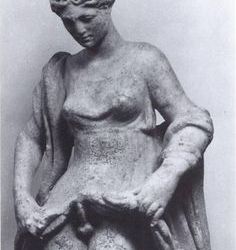
Did you know there’s a male Aphrodite? He's called Aphroditos, or Aphroditus.
Something unique about Aphroditos is that he maintains female breasts while also having male genitals, and sometimes depicted with facial hair. Sometimes Aphroditos is depicted with traditionally male features but retains a vulva. Many statues of Aphroditos depict him lifting his dress to reveal a penis. This deity, of course, originated from the same place as many of Aphrodite’s origins: Cyprus, later making his way to Athens.
Needless to say, Aphroditos is androgynous, intersex, and/or transgender. As Bettany Hughes explains, “some believed that the goddess kept her father’s castrated male sex organs within her .... or [he is] simply an early recognition of the nonbinary nature of sex and desire.” The first part, in reference to Aphrodite’s birth where she was born from Ouranos’s castrated genitals being thrown into the sea, does make sense when I think about it, as does the second part. Desire—and not strictly sexual desire—does not discriminate; it’s something within us all, no matter how we choose to identify ourselves.
It is also important to note that the divine—gods and goddesses—are not bound to human constructs such as gender, nor do they only take on one face. We identify a deity being male and female for our own convenience, so who’s to say that the idea of an androgynous/intersex/transgender/nonbinary deity can’t exist? I’ve explored this most with Dionysos, who is the god most known for breaking the constraints of gender.
Aphroditos makes perfect sense. There are many male gods of love, sex, and desire such as Eros, but Aphrodite, to me, is a deity who represents universal love, universal sex, universal desire, and universal beauty (not to say that Eros and other deities can’t stand for this either). Not to mention her nature of duality, which I apply to all her domains.
There’s an epithet of Aphrodite that I’m really fond of: Aphrodite Pandemos, which means Aphrodite common to all people, or the people’s Aphrodite. Although I interpret this more to do with worship, meaning anyone can worship her, regardless of class, social status, etc. I also apply this to sex and gender. No matter your sex and gender, you can follow her, and no matter how we perceive Aphrodite, she is a deity representative of all sex, gender, and desire. This, of course, translates into Aphroditos, which could mean exactly that.
Aphroditos also goes by another name, as I’m sure some of you know: Hermaphroditos, or Hermaphroditus, who is the son of Aphrodite and Hermes (a combination of their name). He eventually became merged with Salmakis, his lover, thus becoming androgynous/intersex. Because of their similar features, Aphroditos was conflated with Hermaphroditos, and today are considered the same deity. Both Aphroditos and Hermaphroditos are most often depicted as being female in appearance and having male genitals.
As I say with all of my posts on the many aspects of Aphrodite, it’s important to acknowledge and respect this aspect of the goddess. Aphrodite and Aphroditos can teach us many things on the spectrum of queerness, and its relation to the world around us, no matter what form or what face they take.
174 notes
·
View notes
Text
Resources & Reading on Aphrodite
Here’s a brief list of resources on Aphrodite that I have found helpful. These resources contain first-hand sources, scholarly analyses, and historical attestants of the goddess that I consider reliable and educational.
Aphrodite’s page on Theoi.com
Venus and Aphrodite: A Biography of Desire by Bettany Hughes
Aphrodite by Monica S. Cyrino
Aphrodite’s page on Britannica
Additional resources for Hellenists
hellenicfaith.com
hellenion.org
Hellenic Polytheism: Household Worship by LABRYS
Recommended reading of works that are devotional and Aphrodite inspired
Aphrodite Made Me Do It by Trista Mateer (poetry)
Blood and Roses: A Devotional for Aphrodite and Venus by Bibliotheca Alexandrina
“Ode to Aphrodite” by Sappho
88 notes
·
View notes
Text
My Favorite Aphrodite Epithets and Why
Happy Aphrodite April, my magnificent swans! Today I’m going to discuss some of my favorite epithets of Aphrodite! I figured this would be nice since I see a lot of posts listing the epithets but not really going into much detail about them. These are ones that I prefer using when I talk to Aphrodite but of course you may choose to find ones that you personally like using! A wonderful list of epithets and titles can be found on Aphrodite’s page on Theoi.com!
Urania (Ourania) - Heavenly, Divine: This is a common epithet and think because it’s so common it’s one that just FITS Aphrodite. It’s natural to use this when referring to her and it’s one of the first ones that pop into my head when I do an impromptu ritual. And I mean come on, heavenly? Divine? That’s totally our girl, Aphrodite!
Aphrogeneia - Foam Born: As my URL would indicate I am partial to Aphrodite’s foam born creation myth. To me, it just seems way more fitting for such a magnificently beautiful Goddess of many attributes to have risen straight from the sea being like “bitches, i’m here!”.
Pandemos - Common to ALL people: This one is probably my favorite of all her epithets. I call it the “shut down” epithet. When someone tries to come at you saying that Aphrodite only represents one standard of beauty, one kind of love, one gender, one sexuality, you throw this epithet at them and they are SHUT DOWN! Aphrodite is a goddess for ALL people, end of story!
Melaenis (Melainis) - Black of Night: You can discover a lot of interesting things about deities by looking at their epithets. Aphrodite especially has a lot of interesting ones. Like this one! When people think of Aphrodite usually visions of the beach and fields of bright colored flowers, pinks, pale blues and greens, are among the first images. But this epithet indicates that there’s a lot more to Aphrodite! Theres a darker side, a side that exists when the sun leaves the sky. I tend to use this epithet in the fall and winter. I find Aphrodite’s darker sides show more when the land is dead and the sun is gone. Its why I prefer to celebrate Adonia in the fall.
Morpho - Of Shapely Form: I enjoy this epithet because for me it indicates that Aphrodite could be seen as a big girl. And i’m not just talking about the “acceptable” fat girl shape. I’m talking big soft bellies, thighs that could crush a skull, arms that jiggle jiggle, and asses so big and round you HAVE to take a moment to thank Aphrodite for such beauty in the world! So yeah, don’t let anyone tell you Aphrodite can’t be a fat girl or that she doesnt support fat girls!
Areia - Warlike; Nikêphoros - Bringer of Victory; Hôplismenê (Hoplismena) - Armed: I grouped these 3 together because I like them for all the same reasons. They point towards Aphrodite’s role as a possible War Goddess. How freakin AWESOME is that? I feel like it makes more sense because we like to pretend that love and war are opposites, which is why Aphrodite and Ares’s relationship seemed so romantic. Yet the truth is love and war actually go hand in hand, wars begin because of love, love blossoms in the midst of war, love can be the fuel to continue a war. I find it way more likely that Aphrodite, being a war goddess,understands Ares bloodthirst for war and battle, and loves him for it not despite it. They both can appreciate the beauty of a battle and the deep relationships formed between the soldiers, something no one can even begin to understand, except Aphrodite and Ares.
697 notes
·
View notes
Text
Is it okay to conflate Aphrodite and Venus? Are they one and the same?
The short answer is: It depends who you ask.
Many people will conflate the two goddess, and others will absolutely attest that they are separate and should not be conflated. I fall somewhere in the middle.
I believe if you’re going to conflate Aphrodite and Venus, you should know the histories of both goddess and form your own thoughts afterward. Aphrodite, Queen of Cyprus, derived from many goddesses—Kypria, Inanna, Ishtar, Astarte, Ashtoreth, and as Bettany Hughes implies, the Lady of Lemba was a figure that could’ve been Aphrodite’s true origin. Aphrodite had been through many lands before reaching Ancient Greece, before becoming Aphrodite.
And before Aphrodite had reached Ancient Rome, Venus was a fertility deity of the ancient Roman tribespeople, as Hughes puts it. The worship of this Venus predates Aphrodite’s introduction to the Romans. There were many similarities between them—Venus being a fertility goddess, as Aphrodite is a goddess of sex and procreation. Aphrodite’s ancient temples were often funded by prostitutes and brothels of which Aphrodite was/is a patron. Venus’s temples were funded by “a tax on women’s sexual misdemeanors.”
Eventually, after Rome had conquered Greece, the two goddess, being as similar as they were, had eventually been combined—their mythologies intermingling. Now it’s difficult to find sources that separate the two goddess and their histories/mythology from before they were melded together. But does this mean it’s bad to conflate them, as they have been for centuries? I’m on the fence.
On one hand, I respect Aphrodite and Venus as separate entities with the qualities honored by the cultures who came before their conflation. On the other hand, they have also become essentially two sides of the same coin.
To completely separate the two, having no connection to other at all, in my opinion, also separates their history. To do this also disassociates Aphrodite from Inanna, Ishtar from Astarte—who you could easily conflate as well. I’ve seen the goddesses referred to as Inanna-Ishtar, and Astarte-Aphrodite. But also, considering them completely the same entity ignores the cults unique to the two goddess, the ones who choose to worship Aphrodite specifically, and those who choose to worship Venus; and ignores the things that do set them apart.
So, is it okay to conflate Aphrodite and Venus? Are they one and the same? Yes and no. Again, it depends on who you ask. I consider myself a devotee of Aphrodite, however, in my worship, Venus has appeared before me many times, thus I have accepted both goddesses as my patroness. I will sometimes refer to her/them as Aphrodite-Venus, or Venus-Aphrodite for the sake of convince. I don’t focus on Venus in my worship, but I do consider her a significant part of it.
I very much see the goddess as two sides of the same coin—not completely the same but not entirely separate. I feel comfortable conflating the two, because no matter what you call her, or what face she takes, whether she’s Aphrodite, Venus, Inanna, or Ashtoreth, love is universal. Whether you follow Aphrodite or pray to Venus, love is love, and we have all felt its effects. This isn’t to discount the other aspects of the goddesses, or to imply that Aphodite and Venus do not have their own separate consciousness, but I hope you understand what I’m saying.
I do encourage anyone interested to look further into this and read up on other people’s perspectives, as this is just my own after a lot of spiritual soul searching within my patroness.
16 notes
·
View notes
Text
Offerings for Aphrodite
To preface this, I’m a firm believer in it doesn’t matter what you give as an offering, as long as it has thought and meaning behind it, the gods will appreciate it (with some exceptions). Most things you offer, chances are, Aphrodite will like it. But if you are stumped on ideas, or want to offer her something that traditionally aligns with her, I’ve compiled a brief list of possible ideas. You can alter these things in any way you see fit.
My personal offerings
These are the things I will usually offer her. I’m bad at being consistent and I’m financially limited, so I can’t exactly afford to be extravagant. That’s okay. Thought and meaning is what matters, so I have a few list of things that I have found are easy for me to offer her while being confident it will satisfy her. My favorite offering to give her are apple slices drizzled with honey. Sometimes I will also make her tea—which kind is up on you. I usually go with a black tea with roses. When I can’t bring myself to prepare something, I’ll light frankincense incense. Whenever I bake, I’ll offer her pieces of cookies, cakes, and anything sweet like chocolate. I also once offered her a collage and a friendship bracelet I made for her in recovery. Lastly, I’ll light a vanilla scented candle for her if I have one.
Colors
Pink — love, friendship, self-love
Red — love, passion, romance, intensity
Blue — reminiscent of the ocean from which she was born
White — could represent the color of pearly white seashells, but could also be a stand-in color if you don’t have anything in the colors above
Foods & Drink
Honey
Chocolate
Vanilla
Baked goods and pastries
Water (Libations)
Sugar
Salt
Tea
Juice
Fruit, especially apples
Wine
Olive oil
Scents
Frakincense
Rose
Myrrh
Vanilla
Stones & Metals
Rose quartz
Copper
Pearl
Aquamarine
Silver
Gold
Animals
Dolphins
Doves
Bees
Swan
Sparrow
Flowers
Rose
Myrrh tree (in reference to the myth of Adonis)
Anemone (in reference to the myth of Adonis)
Objects/Misc
Seashells, sand dollars, fish, and things reminiscent of the ocean
Dagger, shield, things that relate to her war aspect
Devotional art/jewelry/digital altars/etc
Makeup, skincare, nail polish, and beauty
Feeling beautiful and doing makeup/skincare
Taking care of yourself
Friday is her sacred day, so many people will give her offerings then, as well as the fourth day of every month, as that is sacred to her as well.
If you’re in a position where you cannot openly give offerings, you can always do libations, which is to pour out liquid in honor of the Theoi—meaning if you have a houseplant, you can water it as a form of libation, or pour out a drink in the sink. An even more subtle offering is filling a glass with water, taking it in your room, and leaving it out for Aphrodite, as water is a life-giving source, so it is equally important as anything else.
If nothing else, in my experience, Aphrodite is most pleased when you are taking care of yourself.
And remember: Even if you aren’t able to give any offerings, or offerings often, the Theoi understand your circumstances. They will not get upset with you. Your devotion and faith are the most important things!
406 notes
·
View notes
Text
Aphrodite is a Sea Goddess
Just like her war aspect, the sea is not something we commonly associate with Aphrodite today, besides the story of her birth. But, in fact, Aphrodite is very much a goddess of the sea just as she is the goddess of love and beauty.
After Ouranos’s castrated genitals were thrown into the sea by Kronos, the water foamed, and out came Aphrodite—born from the sea and Ouranos. Because of her birth story, she is closely associated with the sea, namely sea foam, seashells, and dolphins. Because of this, when hearing that Aphrodite was a sea goddess I thought Yeah, that makes sense. But actually, Aphrodite’s ties with the ocean go much deeper than that.
In Bettany Hughe’s book Venus and Aphrodite she explains that Aphrodite saw many of the sailors arriving to the shores Cyprus a safe return, thus the sailors would pray to her for this reason. Cyprus, being the sacred land of Aphrodite (and in my opinion the true origin of Aphrodite before she was Aphrodite, when she was simply called the Queen, the Goddess, or Kypria), she was the patron of the port island. Statues were erected on the shores, as Aphrodite looked over the shore awaiting the sailors.
To me, this signifies that she keeps safety in the waters, as well as births beauty from it.
Usually I don’t like to include UPG (Unverified Personal Gnosis) in these posts, as I always advocate to take UPG from others with a grain of salt, but I did once have a dream about Aphrodite tearing through the seas in raging tsunamis. In my experience, the Theoi never give me dreams that are outside their domain (for example, if I dream of Zeus, it’d take place in the sky), and after the fact, I was certain that she was not only a sea goddess, but a sea goddess to be reckoned with.
Even though she kept sailors safe on their return to the shores, as anyone who’s a devotee of the goddess knows, she has a frightful, chaotic aspect to her as well. It makes sense when considering the duality of love—soft, tender, warm, wonderful; but also heartbreaking, maddening, and painful beyond words. I interpret this duality among all her domains, including the sea. She can keep the waters calm, or rip them to shreds. Aphrodite, as a sea goddess, demands respect, and that should not be forgotten.
30 notes
·
View notes
